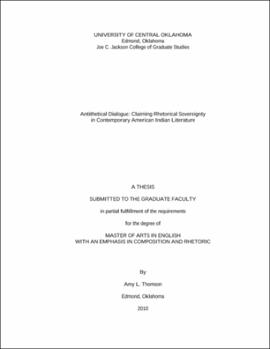| dc.contributor.advisor | Macey, J. David | |
| dc.contributor.author | Thomson, Amy L. | |
| dc.date.accessioned | 2020-05-26T20:34:39Z | |
| dc.date.available | 2020-05-26T20:34:39Z | |
| dc.date.issued | 2010 | |
| dc.identifier.other | (AlmaMMSId)9978578185202196 | |
| dc.identifier.uri | https://hdl.handle.net/11244/324639 | |
| dc.description.abstract | "Canonical Euro-American literary and historical discourses exhibit American Indians in stereotypical terms. The characterization of American Indians in Euro-American discourse creates a silent absence in which American Indians are denied rhetorical sovereignty; American Indian rhetorical sovereignty is therefore difficult to assess within the canonical Euro-American rhetorical tradition. Efforts by American Indian authors to claim rhetorical sovereignty demonstrate that not everyone reads from the space that Euro-American authors occupy. American Indian writers have developed a rhetorical model that allows them to claim rhetorical sovereignty. This model, which is antithetical in nature, requires a dialogue between two opposing discourses: American Indian discourse by American Indians and discourse about American Indians by Euro-American authors. This antithetical model and its results can be understood through an analysis of Robert Bird's Nick of the Woods and Sherman Alexie's Indian Killer. Bird presents the stereotypes ascribed to American Indians in Euro-American literature, while Alexie shows the way American Indian authors claim rhetorical sovereignty through American Indian writing. This antithetical rhetorical practice allows American Indian authors to assert sovereignty by reclaiming the absent voice of the "other," and it enables both American Indian and Euro-American audiences to see the space between the two opposing discourses where that rhetorical sovereignty can operate. This model, illustrated the relationship between Bird's and Alexie's novels, challenges the authority of the Euro-American canon and its representation of American Indians while highlighting the importance of American Indian literature and the need for minorities to claim rhetorical sovereignty."--Abstract. | |
| dc.rights | All rights reserved by the author, who has granted UCO Chambers Library the non-exclusive right to share this material in its online repositories. Contact UCO Chambers Library's Digital Initiatives Working Group at diwg@uco.edu for the permission policy on the use, reproduction or distribution of this material. | |
| dc.subject.lcsh | Bird, Robert Montgomery, 1806-1854 | |
| dc.subject.lcsh | Alexie, Sherman, 1966- | |
| dc.subject.lcsh | Sovereignty in literature | |
| dc.subject.lcsh | Indians in literature | |
| dc.title | Antithetical dialogue: claiming rhetorical sovereignty in contemporary American Indian literature | |
| dc.type | Academic theses | |
| dc.contributor.committeeMember | Petete, Timothy | |
| dc.contributor.committeeMember | Stein, Wayne | |
| dc.thesis.degree | M.A., Composition and Rhetoric | |
| dc.identifier.oclc | (OCoLC)ocn841367523 | |
| thesis.degree.grantor | Jackson College of Graduate Studies | |
